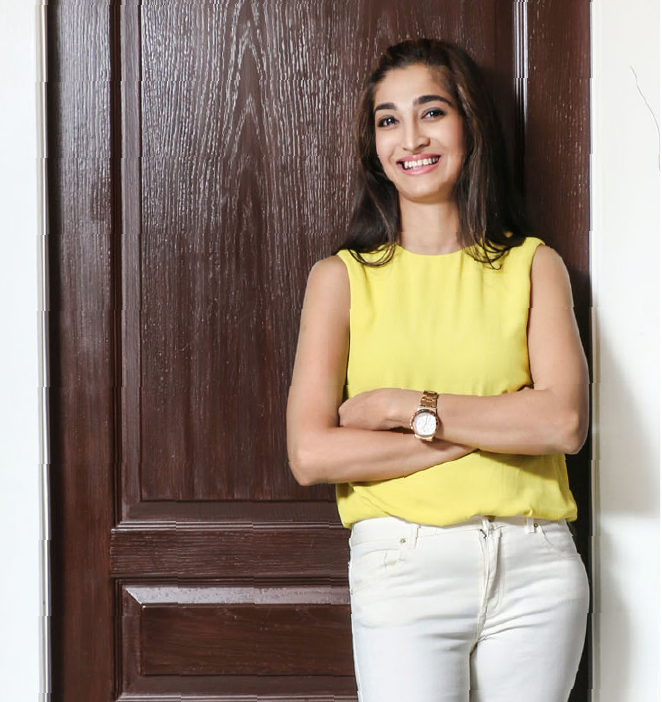By Reena Karim
Battling lymphoma and losing a child, Rekha Kalra Kishnani recounts her life’s toughest ordeal
| It was 2007: Rekha Kalra Kishnani still remembers the day at the doctor’s office, when she heard those three dreaded words, “you have cancer.” She was just 33 and pregnant with her second daughter, when those words changed her life. Rekha was diagnosed with non-Hodgkins lymphoma – a form of cancer that develops in the lymphatic system. Hers was aggressive and had grown to the size of a pomelo fruit inside her chest cavity within a short span of time. |
Once the diagnosis was made and the cancer confirmed, disbelief gave way to acceptance and Rekha’s priority immediately turned towards her unborn daughter. “It wasn’t about me,” she says. “It was about her, my Saira, and saving her life and doing what’s required urgently.” Within a week of the discovery, Rekha underwent an emergency C-section to give birth to her daughter (prematurely at 33 weeks). Immediately after she began chemotherapy, while Saira too, who was born with several health complications, was being treated. During this time Rekha did not only have to deal with her own struggles with cancer, but also watch her new born slowly slip away.
After years of treatment, Rekha, now at 42, is in remission and recently gave birth to her second child. This mother of two healthy girls, aged 10 and one, recounts her ordeal, her loss, and why she chose not to keep her cancer in the dark.
After the diagnosis was made, what were your fears?
The first five days I broke down thinking why me? There were a lot of questions. Am I going to die? Am I going to get well? Who is going to look after my kids? But I think I pushed those thoughts at the back very quickly, because I made up my mind that I was going to do whatever it takes to become better. It went from ‘I have to’, to ‘I will.’ I started reading a lot of books, trying to get as informed as possible. There are, of course, days that I gave up hope, because after a few cycles of chemo the doctors say things like ‘oh it’s not working’, and that was discouraging. My end goal was to get better and I just kept focus on that.
hat treatment did you undergo?
After having a C-section, I underwent 20 sessions of radiation. Once those were completed, I had to go through eight cycles of chemotherapy. This had to be repeated once every three weeks. A year later, for two years, I underwent what is known as maintenance therapy, which involved an intravenous drip for two years, once every six months. This ensured that to wipe out any remnants of lingering cancer cells in my body. Later, I had a massive surgery in 2010 because my right lung almost collapsed.
What were some of the side effects?
The treatment lowers the immunity drastically. I kept running in and out of the hospital a few times, even a sniffle could be bad for me. My body couldn’t fight it. My hair started falling out in chunks. It was really scary. At one point it looked very patchy, so I just shaved it all off. It was very liberating. I actually asked the doctor to give me medication to stimulate my diet, because I had no appetite. I had aches in all my joints. I had some mood alterations too. Every night I needed a sleeping pill to sleep.
Tell us about Saira?
Saira was born with a multitude of health complications. She had a lot of intestinal issues. She had to have surgery two days after she was born. She was in Bumrungrad Hospital for seven months, and then for two months at Ramathibodi. There were both good days and bad days. By Halloween, and I remember that so clearly, at around 5am I got a call from the hospital and they said her heart rate had slowed down. That was the day I realised she was not going to make it. My heart finally let her go. I died that day. She passed away in April. Saira, in her few months here was larger than life in that tiny body. Her love for me is so pure. I feel honoured at the sacrifice she made for me. She came to me to save my life.
How did you find strength in these dark hours?
I had a lot of family support, they were my silent strength. There were times when I broke down, but my husband would console me. I tried not to cry in front of my parents. I was the one who had to tell my parents that everything would be alright, instead of the other way around. My motivation was to get well because of my kids.
Did this have an effect of your marriage?
Yes, it did in some ways. It took us apart, but it also brought us closer. My husband doesn’t easily express his emotions so it was very hard for me to find out what was going through his head. I think his coping mechanism was to stay at work a lot. So he would be out of the house 12 hours a day. I think it was hard for him to see me going through this and our baby in the hospital. My eldest daughter Aria was two at the time, and didn’t quite understand what was going on. She saw her mother becoming bald. She was probably confused. I tried to make everything as normal as possible, but I am sure she wondered why is mom sleeping a lot, and not sitting or playing with me. I was agitated a lot. I think chemo really made me lose my patience a lot. I couldn’t help it.
Why did you decide to be vocal about the cancer?
I was not secretive about it since day one, but I didn’t announce it either. If anyone asked, I told them. Aside from being concerned, people within the society were curious. There were a lot of misconceptions. There was an acquaintance who thought I got cancer because I smoke. People get heart attacks or strokes and don’t hide it, and in fact my lymphoma was not even lifestyle related, the way most diseases are, so I had nothing to be ashamed of. But there’s still a very big stigma around cancer.
Did you ever get any help outside of your family?
No, I didn’t get any help from a nutritionist or see a psychologist, because this is an area that Thailand really lacks in. Everything here is so closed off. At that time there was no support groups, no one to tell me what I should eat or not. I had to find everything myself through research online. If I had these external assistances I think it would have made my life a little bit easier.
What have you taken away from this ordeal?
I have learned to love myself. I have learned to be more fluid and flexible, to plan less and go with the flow. I have the need to be perfect, and I wasn’t allowing myself to be just me, and be loved for that. But now I realise that being true to myself is so liberating.
This article first appeared in October-November issue of Masala Magazine (masalathai.com)
After years of treatment, Rekha, now at 42, is in remission and recently gave birth to her second child. This mother of two healthy girls, aged 10 and one, recounts her ordeal, her loss, and why she chose not to keep her cancer in the dark.
After the diagnosis was made, what were your fears?
The first five days I broke down thinking why me? There were a lot of questions. Am I going to die? Am I going to get well? Who is going to look after my kids? But I think I pushed those thoughts at the back very quickly, because I made up my mind that I was going to do whatever it takes to become better. It went from ‘I have to’, to ‘I will.’ I started reading a lot of books, trying to get as informed as possible. There are, of course, days that I gave up hope, because after a few cycles of chemo the doctors say things like ‘oh it’s not working’, and that was discouraging. My end goal was to get better and I just kept focus on that.
hat treatment did you undergo?
After having a C-section, I underwent 20 sessions of radiation. Once those were completed, I had to go through eight cycles of chemotherapy. This had to be repeated once every three weeks. A year later, for two years, I underwent what is known as maintenance therapy, which involved an intravenous drip for two years, once every six months. This ensured that to wipe out any remnants of lingering cancer cells in my body. Later, I had a massive surgery in 2010 because my right lung almost collapsed.
What were some of the side effects?
The treatment lowers the immunity drastically. I kept running in and out of the hospital a few times, even a sniffle could be bad for me. My body couldn’t fight it. My hair started falling out in chunks. It was really scary. At one point it looked very patchy, so I just shaved it all off. It was very liberating. I actually asked the doctor to give me medication to stimulate my diet, because I had no appetite. I had aches in all my joints. I had some mood alterations too. Every night I needed a sleeping pill to sleep.
Tell us about Saira?
Saira was born with a multitude of health complications. She had a lot of intestinal issues. She had to have surgery two days after she was born. She was in Bumrungrad Hospital for seven months, and then for two months at Ramathibodi. There were both good days and bad days. By Halloween, and I remember that so clearly, at around 5am I got a call from the hospital and they said her heart rate had slowed down. That was the day I realised she was not going to make it. My heart finally let her go. I died that day. She passed away in April. Saira, in her few months here was larger than life in that tiny body. Her love for me is so pure. I feel honoured at the sacrifice she made for me. She came to me to save my life.
How did you find strength in these dark hours?
I had a lot of family support, they were my silent strength. There were times when I broke down, but my husband would console me. I tried not to cry in front of my parents. I was the one who had to tell my parents that everything would be alright, instead of the other way around. My motivation was to get well because of my kids.
Did this have an effect of your marriage?
Yes, it did in some ways. It took us apart, but it also brought us closer. My husband doesn’t easily express his emotions so it was very hard for me to find out what was going through his head. I think his coping mechanism was to stay at work a lot. So he would be out of the house 12 hours a day. I think it was hard for him to see me going through this and our baby in the hospital. My eldest daughter Aria was two at the time, and didn’t quite understand what was going on. She saw her mother becoming bald. She was probably confused. I tried to make everything as normal as possible, but I am sure she wondered why is mom sleeping a lot, and not sitting or playing with me. I was agitated a lot. I think chemo really made me lose my patience a lot. I couldn’t help it.
Why did you decide to be vocal about the cancer?
I was not secretive about it since day one, but I didn’t announce it either. If anyone asked, I told them. Aside from being concerned, people within the society were curious. There were a lot of misconceptions. There was an acquaintance who thought I got cancer because I smoke. People get heart attacks or strokes and don’t hide it, and in fact my lymphoma was not even lifestyle related, the way most diseases are, so I had nothing to be ashamed of. But there’s still a very big stigma around cancer.
Did you ever get any help outside of your family?
No, I didn’t get any help from a nutritionist or see a psychologist, because this is an area that Thailand really lacks in. Everything here is so closed off. At that time there was no support groups, no one to tell me what I should eat or not. I had to find everything myself through research online. If I had these external assistances I think it would have made my life a little bit easier.
What have you taken away from this ordeal?
I have learned to love myself. I have learned to be more fluid and flexible, to plan less and go with the flow. I have the need to be perfect, and I wasn’t allowing myself to be just me, and be loved for that. But now I realise that being true to myself is so liberating.
This article first appeared in October-November issue of Masala Magazine (masalathai.com)




















